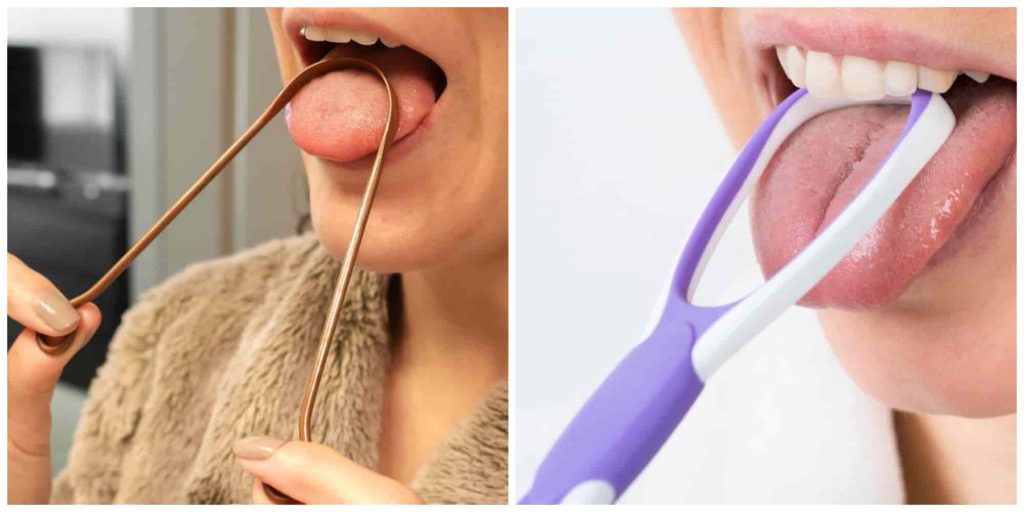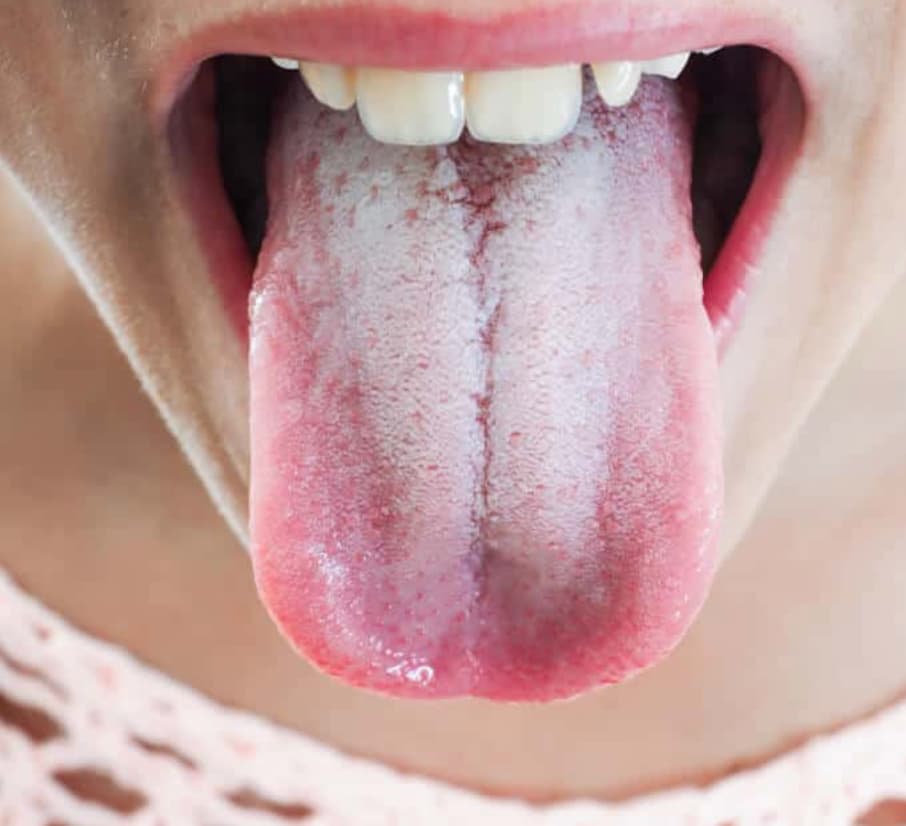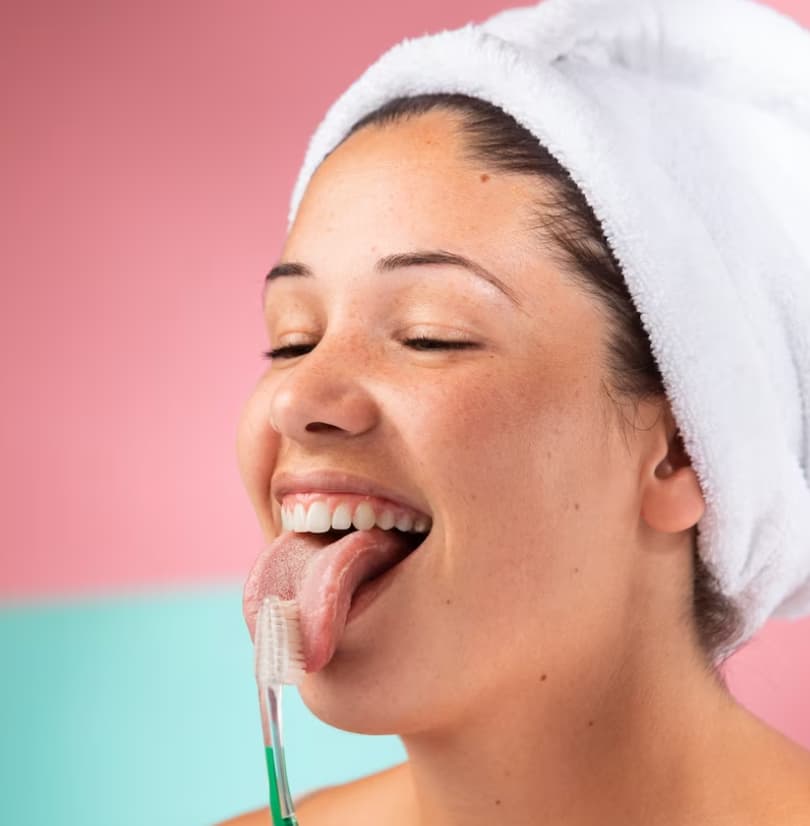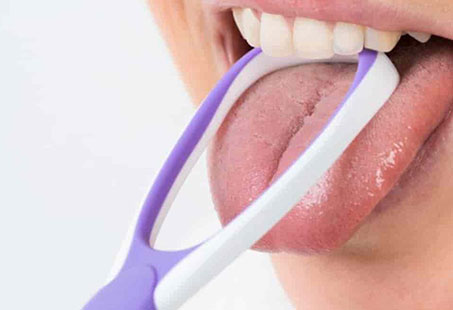Many people clean their tongues while brushing their teeth. However, there are special tools designed to specifically clean the tongue. These are known as tongue scrapers.
Essentially, these are handheld instruments with curved edges or grooves that you place on your tongue to get rid of the unpleasant-looking coat on it.
But that’s not all this is used for. Another common reason why many people turn to scrapers is that they’re believed to help with bad breath. However, that might not exactly be the case.
Also, you need to be careful about how you use a scraper because it does have the potential to damage your tongue. In this guide, you’ll learn more about whether or not scrapers actually work, how to use them, and if they’re safe.
What Is A Tongue Scraper?
A tongue scraper is a spoon-shaped or tong-like tool made of plastic or steel that’s used to clean the tongue.

As the name suggests, it’s intended to “scrape” any coating on the tongue with the goal of cleaning it or getting rid of bad breath.
Different researchers have indicated that tongue scrapers can not only reduce plaque but can also be helpful in managing halitosis or bad breath.
However, many people also clean their tongues using their toothbrush. And whether or not tongue scrapers are better than toothbrushes remains doubtful.
A Cochrane review, for instance, found that there is “weak and unreliable evidence” in favour of tongue scrapers to reduce volatile sulfur compounds.
These bad-smelling compounds are produced by bacteria that can be found on the tongue and the back of the throat. And these are usually responsible for causing bad breath.
So, by using a tongue scraper to get rid of these sulfur compounds, it might be possible for you to get a better breath.
Still, just keep in mind that using a tongue scraper isn’t essentially the only best way to clean your tongue. You can do the same with a toothbrush as well.
What Does A Tongue Scraper Do?
Tongue scrapers are claimed to get rid of bad breath and white or yellow coating that can form on the tongue. They are also believed to improve taste.
According to the Mayo Clinic, both yellow and white tongues can be a result of the enlargement of papillae on the tongue (which can be due to poor oral health, illness, alcohol, smoking, etc.).

Because of this, dead and shed cells, food substances and even bacteria in the mouth can get trapped on the tongue. However, that’s not the only cause, you can also have a white tongue as a result of dehydration.
So, while a tongue scraper may help you get rid of the coating, it won’t address the underlying problem. Also, on seeing the colour of your tongue change, your first resort shouldn’t be trying to find a tongue scraper.
That’s because it can be a sign of a serious health problem. For instance, rarely, a white tongue can be symptomatic of oral cancer, or it can also be a sign of an infection.
Similarly, bad breath can’t always be blamed on the tongue. It can also be due to gum infection, smoking, dry mouth, a diet high in acidic and sugary foods, etc.
According to the American Dental Association (ADA), you can think of tongue cleaning as more of a “personal preference” as it is “not necessary.”
They say that bacteria causing bad breath can get back on your tongue just as fast as you remove it. So, its effects might be very temporary and cleaning your tongue might not do much for you.
Do Tongue Scrapers Work?
Tongue scrapers can work. There might be a noticeable difference in the colour of your tongue right after you scrape the gunk or coating off.
One study published in the Journal of Clinical Periodontology found that while tongue scrapers do get rid of the coating, they don’t get rid of the bacteria on the tongue.
Additionally, the researchers found that after 2 weeks of use, tongue scraping also improved taste.
How To Clean The Tongue?
Essentially, there are two ways in which you can clean your tongue:
- A toothbrush or the plastic scraper at the back of the brush
- Plastic or metal tongue scrapers

In any case, you need to be gentle. While a brush may seem more abrasive than a tongue scraper, make sure to use the one that has soft bristles on it.
Using a back-and-forth motion, you can clean your entire tongue, starting from the back. It’s not anything that you need to do separately.
You can do it while you’re brushing your teeth. That way, you can clean your tongue twice a day.
On the other hand, if you’re using a tongue scraper, you have to move it across the tongue, starting from the back.
While some studies suggest that there might not be much of a difference between the efficacy of tongue cleaners and tongue scrapers, a recent study published in The Journal of Contemporary Dental Practice compared different tongue-cleaning devices.
The researchers included a toothbrush with a back scraper and two plastic and metal scrapers in the study to conclude that all of them helped reduce the coating on the tongue.
However, plastic and metal scrapers, especially plastic, also significantly reduced the anaerobic bacteria on the surface of the tongue compared to the toothbrush scraper.
How To Clean The Back Of The Tongue?
Some people find it more difficult to clean the back of the tongue because of a gag reflex.
If this is the case, whenever you’re trying to clean the back of your tongue, make sure to stick your tongue out as much as you can. You can also try distracting yourself by thinking of something else or even listening to music.
Even nose breathing is believed to help with this gag reflex while cleaning the tongue. After that, you can clean it however you find it easy, either with a brush or scraper.
How To Use A Tongue Scraper?
For both the spoon-shaped and scarper tongs, the directions of use are more or less the same. These are as follows:
- Place the scraper at the back of the tongue (the spoon end or the U-shaped curve of the tong).
- Gently pull it forward to clean the surface of the tongue. Be careful to not cut your tongue.
- Don’t go from front to back. But you can clean the tongue at different angles (rinse the scraper after each turn).
- After you feel like your tongue is clean, wash the scraper with soap and warm water and store it in a dry area.
When To Use A Tongue Scraper?
It’s generally recommended that you use a tongue scraper twice a day, both times after you’ve brushed your teeth.

But as mentioned above, its results might be short-lived because the bacteria that cause bad breath can grow on your tongue very quickly.
Benefits Of Using Tongue Scrapers
There might be different benefits of using tongue scrapers, such as:
- Improvement in appearance and colour of the tongue due to the removal of the coating.
- Fresher and cleaner breath as sulfur compounds are removed.
- Betterment of overall oral health as it might get rid of some types of bacteria on the tongue.
- Improvement in taste.
Since your tongue can harbour bacteria, it might be a good idea to clean it when you’re brushing your teeth.
How To Clean A Tongue Scraper?
Warm water and soap are enough to clean the scraper for the tongue (although further check the manufacturer’s instructions for this). Just make sure to get all the sides, and once you’ve washed it, dry it and then store it in a dry area as well.
According to WebMD, if you’re regularly using your scraper, you should consider replacing it after every 3-4 months. In any case, you must be careful about using a tongue scraper.
A case report published in Emerging Infectious Diseases reported a woman who developed infective endocarditis (infection of the lining of the heart and also affecting the valves) which the researchers suspected was due to the use of a tongue scraper.
Conclusion
While cleaning the tongue might not be considered necessary, many people feel like they have a cleaner mouth after tongue cleaning. Also, it can help get rid of the coating on the tongue and may even reduce some of the bacteria, which can help with your overall oral health.
There are different studies on the best way to clean the tongue. However, there’s no definitive consensus. Some say that scrapers are better, while others say that just your toothbrush can also do a good enough job. You can use either.
But make sure that whatever you’re using is clean. If you’re using a scraper, make sure to wash it after each pass and after you’ve used it. But if you are noticing any abnormal changes in your tongue, make sure to get in touch with a qualified dentist. You can also have a consultation at a dental clinic in Turkey.
Reviewed and approved by Dr Izbel Aksit
FAQ
Are tongue scrapers effective?
Tongue scrapers can be effective in getting rid of the coating on your tongue and may even help with bad breath.
Are tongue scrapers healthy?
There’s nothing wrong with scraping your tongue. However, you must apply gentle pressure only. Otherwise, you might even end up cutting your tongue.
Are tongue scrapers necessary?
You don’t necessarily need to use a tongue scraper for tongue cleaning. Toothbrushes or the scrapers on their back can also be used.
Are tongue scrapers reusable?
Tongue scrapers can be reused. But it’s generally recommended that they be replaced after 3-4 months of regular use.
Can a tongue scraper damage your tongue?
If you’re applying too much pressure when using a tongue scraper, it might end up affecting your taste buds, and you might even draw blood.
Do tongue scrapers hurt?
Tongue scrapers should not hurt. However, they might trigger your gag reflex, especially if placed at the very back of the tongue.
Are tongue scrapers safe?
Tongue scrapers are considered safe, but make sure to keep them clean and in a dry place.
Should you clean your tongue?
According to the American Dental Association, it’s not necessary to clean the tongue. Still, it might be better for your oral health if you clean your tongue.
How to clean your tongue naturally?
Drinking water might help wash away some of the things on your tongue. Also, when you’re hydrated, your tongue won’t turn white due to dehydration. Other than that, make sure to have good oral hygiene and avoid smoking and/or drinking too much alcohol.
